Americans have long believed that major political donors and special interests have too much influence on politics and that ordinary people have too little influence. Most see voting as the best way for average Americans to impact the direction of the country.
But the belief that there is too much money in politics is widespread. References to the influence of money and concerns about corruption are some of the most frequently cited critiques of the political system, and many Americans see monetary gain as a reason why most elected officials seek office to begin with.
This chapter details that an overwhelming share of Americans hold the view that the amount of money individuals and organizations can spend on political campaigns should be limited – and a majority say they think it legally could be.
Influence in congressional decision-making
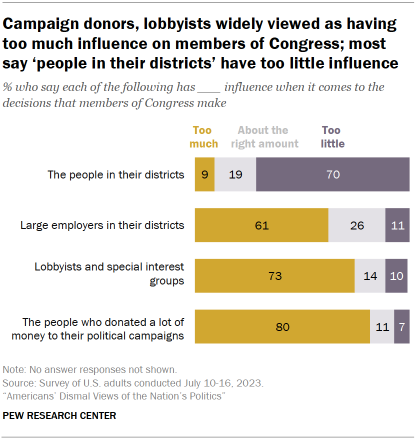
When it comes to the decisions made by members of Congress, large shares of Americans say major donors, lobbyists and special interests have too much influence.
By contrast, just 9% of adults say the people in lawmakers’ districts have too much influence; that compares with 70% who say the people in their districts have too little influence (19% say they have about the right amount).
Americans’ views on which groups have influence on the decisions made by members of Congress are similar across party lines:
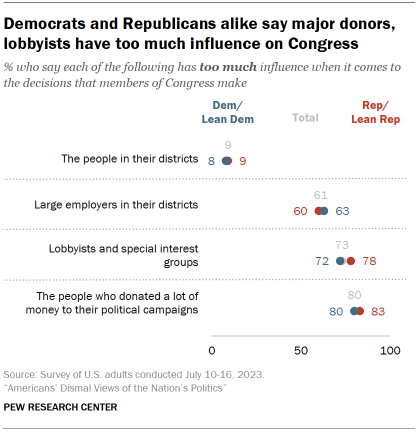
- Around eight-in-ten Republicans and Republican-leaning independents (83%) say people who donate a lot of money to campaigns have too much influence on decisions made by members of Congress. A nearly identical share of Democrats and Democratic leaners (80%) say the same.
- Majorities in both parties also say lobbyists, special interests and large employers in lawmakers’ districts have too much influence.
- Relatively small shares in both parties say people in lawmakers’ districts have too much influence. Nearly identical majorities of Republicans (72%) and Democrats (71%) say they have too little influence.
Views on limiting the role of money in politics
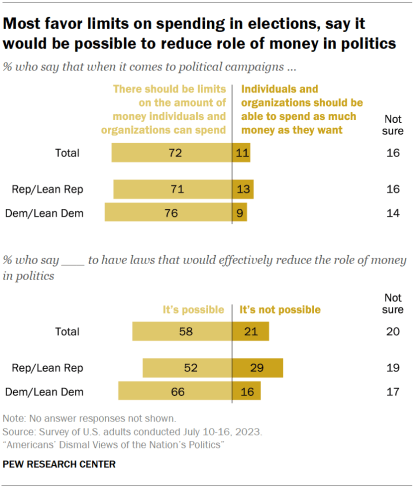
By a wide margin, the public supports limiting the amount of money spent on political campaigns: 72% say there should be limits on spending by individuals and organizations, while just 11% say they should be able to spend as much as they want.
Comparable majorities in both parties (76% of Democrats, 71% of Republicans) say there should be campaign spending limits.
Nearly six-in-ten Americans (58%) say it is possible to have laws that would effectively reduce the role of money in politics, while 21% say it is not; 20% are not sure.
Democrats are more likely than Republicans to say it is possible to have laws that reduce the influence of money on politics. About two-thirds of Democrats say this is possible (66%), while only 16% say it is not. Roughly half of Republicans (52%) think this is possible, while 29% say it is not.
Views on what kinds of activities can change the country for the better
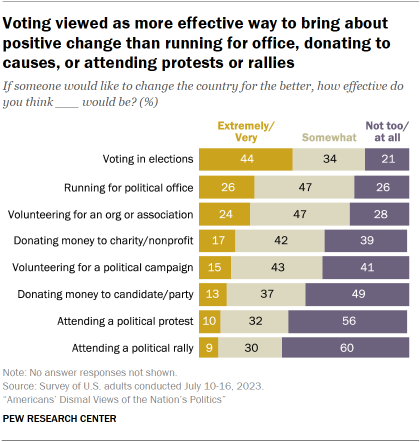
Presented with a number of ways that someone might try to change the country for the better, Americans rate voting in elections as the most effective of these.
Just over four-in-ten U.S. adults (44%) say that voting is an extremely or very effective way to change the country for the better, while 34% say it is somewhat effective and 21% say it is not too or not at all effective.
About a quarter describe both running for political office (26%) and volunteering for an organization or association (24%) as at least very effective.
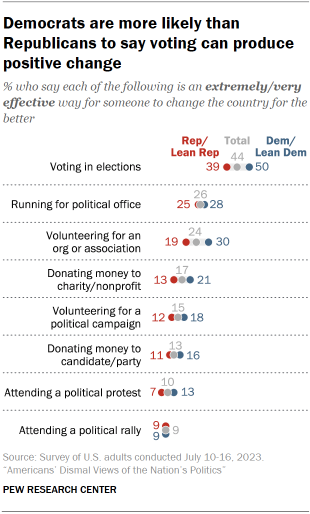
Fewer adults say this about other items included in the survey: donating money to a charity or nonprofit (17% say this is extremely or very effective), volunteering for a political campaign (15%), donating money to a political candidate or party (13%), and attending a political protest (10%) or rally (9%).
A majority of adults say that attending a political rally (60%) is not too or not at all effective as a way to change the country for the better. Nearly as many (56%) say the same about attending a political protest.
Republicans’ and Democrats’ views on the effectiveness of each of these items are similar, though slightly larger shares of Democrats than Republicans rate several as extremely or very effective.
Democrats are more likely than Republicans to view voting in elections (50% of Democrats, 39% of Republicans) and volunteering for an organization or association (30% vs. 19%) as extremely or very effective.
How much can voting affect the future direction of the country?
Overall, a 57% majority of Americans say that voting by people like them can affect the future direction of the country a lot (20%) or some (36%).
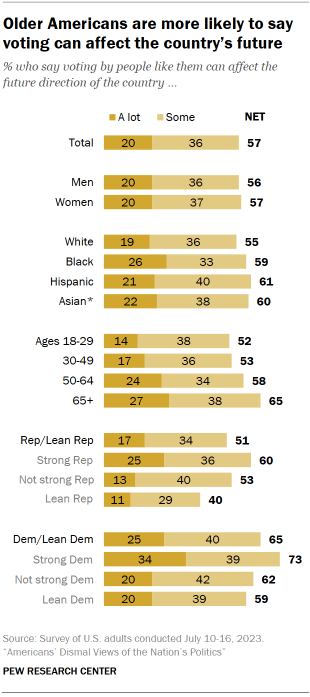
Roughly three-in-ten (31%) say that voting by people like them has “not much” of an effect, and 11% say it has no effect at all.
About half of adults under age 50 (52%) say voting can have at least some effect on the country’s future direction, compared with a majority (61%) of those 50 and older.
And while Democrats are more likely than Republicans to say voting has at least some effect overall, those who identify as the strongest partisans within each party view voting as most effective.
Six-in-ten strong Republicans say that voting can have at least some effect; 53% of those who identify with the Republican Party, but not strongly and 40% of Republican leaners say the same. Among Democrats, 73% of strong Democrats say this, compared with 62% of not strong Democrats and 59% of Democratic leaners.
Age differences on the impact of voting are evident in both partisan coalitions. In both parties, those ages 50 and older are more likely than younger adults to say voting can have at least some effect on the country’s future direction.
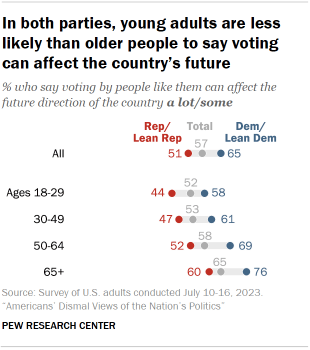
Among Republicans and Republican leaners, 60% of those 65 and older say voting can have at least some effect on the country’s future direction, compared with roughly half of those ages 50 to 64 (52%) and 30 to 49 (47%). Among Republicans under age 30, 44% say voting can have a lot or some effect on the country’s direction.
Age differences are similar among Democrats and Democratic leaners. Democrats 65 and older are 18 percentage points more likely than those under 30 to say voting can have at least some effect on the country’s direction.




